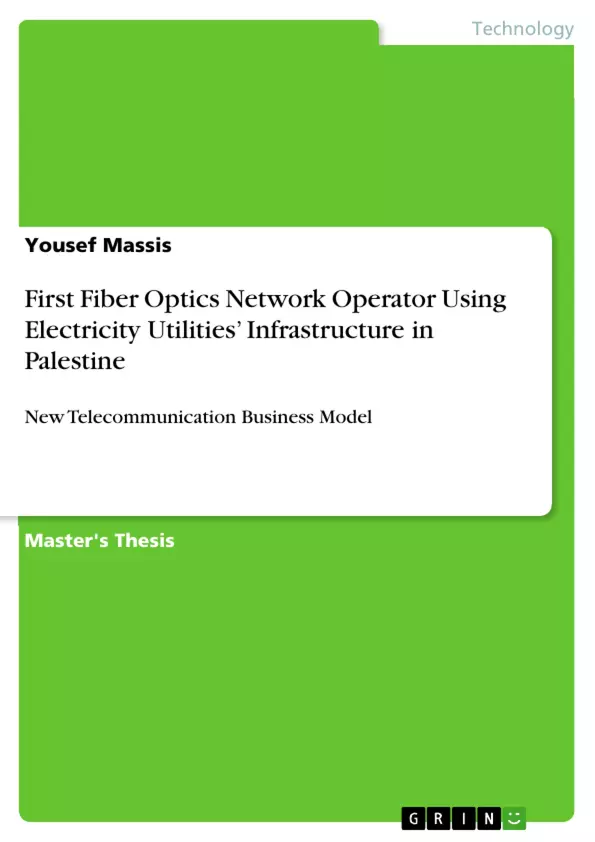This study introduces a “Full Separation” as a new telecommunication business model in Palestine with a new telecommunication company in the active network layer of the business model. It motivates and engages the electricity utilities in the new model through the use of their infrastructure, which in turn would help in reducing the highly required investment; it introduces new technologies and services; it supports and induces the government to open doors for competition through alternative infrastructures; and it highlights the importance of the existence of a strong legal and regulatory party.
The evolution in the telecom industry with the highly increasing demand for higher capacity networks with the upcoming new applications; significant revolutions lead the global telecommunication industry to radical changes to the market structure, and to intensive challenges with the old business models and the existing regulations of the industry.
In Palestine, with the global trends toward the liberalization and opening up the competition in the telecommunication market that have been raised in the last decades, unfortunately, the fixed broadband market is still monopolistic with high entry and exit barriers; there are still lack of policies and regulations; the absence of a regulatory party; in addition to the critical situation of Palestine which increase the fears and risk for investors to enter the market. Qualitative and quantitative methods, in addition to strategic management tools with a chosen business model concept based on the global fixed broadband business models are used to come up with reliable results and a valid model.
Inhaltsverzeichnis (Table of Contents)
- Chapter One: Introduction
- Overview
- Problem Definition
- Conceptual Framework
- Research Questions
- Significance of the Study
- Limitations of the Study
- Structure of Thesis
- Chapter Two: Literature Review
- Global Overview
- Business Models: As a Strategic Management Approach
- Chapter Three: Methodology
- Research Approach
- Data Collection Methods and Procedures
- Chapter Four: Situational Analysis
- Telecommunication Industry Situation In Palestine
- SWOT Analysis
- Analysis & Findings
- Business Models' Analysis
- Model Design
- Service Design
- Organization Design
- Technology Design
- Finance Design
- Legal & Regulatory Framework
- Potential Transformation in the Telecommunication Sector
- Conclusion & Recommendations
Zielsetzung und Themenschwerpunkte (Objectives and Key Themes)
This thesis aims to analyze the current situation of the fixed broadband market in Palestine and propose a new business model for a telecommunications company utilizing the existing electricity infrastructure. The study explores the potential of a “Full Separation” model to overcome challenges faced by the market, such as high entry barriers, lack of regulation, and a monopolistic environment.- Challenges in the Palestinian telecommunications market
- The potential of a “Full Separation” business model
- Leveraging existing infrastructure for new telecommunications services
- The role of regulation and legal frameworks in fostering competition
- The impact of new technologies on the telecommunications landscape
Zusammenfassung der Kapitel (Chapter Summaries)
- Chapter One: Introduction: This chapter introduces the research topic, outlining the problem of a monopolistic fixed broadband market in Palestine and the need for a new business model. It defines the conceptual framework, research questions, significance of the study, limitations, and the structure of the thesis.
- Chapter Two: Literature Review: This chapter examines relevant literature on the global telecommunications industry, focusing on business models as a strategic management approach. It explores global trends in liberalization and competition, and relevant case studies.
- Chapter Three: Methodology: This chapter details the research approach, data collection methods, and procedures employed in the study. It outlines the use of qualitative and quantitative methods to gather data and analyze the situation.
- Chapter Four: Situational Analysis: This chapter analyzes the current state of the telecommunications industry in Palestine, including a SWOT analysis of the market. It examines the challenges and opportunities for new entrants in the fixed broadband market.
- Analysis & Findings: This chapter analyzes the potential of a “Full Separation” business model for the Palestinian market. It includes a detailed design of the proposed model, covering aspects such as service, organization, technology, and finance. The chapter also examines the legal and regulatory framework necessary to support the new model.
Schlüsselwörter (Keywords)
The thesis focuses on the telecommunications industry in Palestine, specifically the fixed broadband market. Key terms include: "Full Separation" business model, electricity infrastructure, telecommunications regulation, competition, entry barriers, monopolistic market, new technologies, and strategic management. The study also explores the impact of global trends on the Palestinian telecommunications landscape.- Citation du texte
- Yousef Massis (Auteur), 2015, First Fiber Optics Network Operator Using Electricity Utilities’ Infrastructure in Palestine, Munich, GRIN Verlag, https://www.grin.com/document/316691



